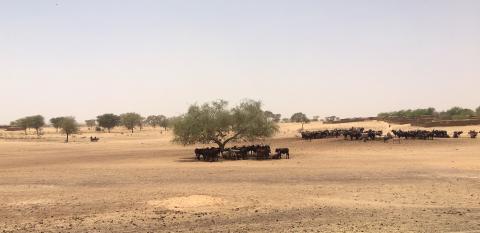O God, you are my God; earnestly I seek you; my soul thirsts for you; my flesh faints for you, as in a dry and weary land where there is no water. —Psalm 63:1
This verse takes on new meaning as we experience life on the edge of the desert. With the low humidity here, as the temperatures climb well above 100 degrees and the sun sears the land, one can become desperate for water very quickly. Our little daughter who used to go to bed with cuddly stuffed animals in the US, now goes to sleep with her water bottle clutched in her arms. This place is very dry both physically and spiritually, and we long for closer fellowship with God for ourselves and for our neighbors to become thirsty for a relationship with God.
We are thankful to have good water here. The deep, hand-dug well in our village is the sole water source and it supplies water to the entire community during the dry season when no rain falls. There are no ponds or streams or any other water sources available. One of the major daily tasks for the men is going to the well to draw water for the livestock. Some people carry water in bull carts to their compound for their household and livestock. Others take their animals to the well twice a day and water them there.
A circular tarp with ropes attached is lowered into the well. Then the bulls are driven away from the well, slowly pulling the tarp full of water up out of the well as they go. A high-pitched whine fills the air as the taut rope is pulled. Women often go to the well to fill a jerrycan with water for household use, then carry it home on their heads.
Water here is precious and is sparingly used for washing and bathing.
Language Learning:
Much of what we hear spoken around us is still a wall of noise. Some conversations we can just catch the drift of what’s being said. Other times it’s completely out of our reach, and once in a while we have the gratification of understanding whole paragraphs of what is spoken. It all depends on who’s speaking or whether the topic contains familiar vocabulary.
This has been very different from our language learning experience in France. For starters, here in our village we have no local people who share a common language with us (not even French). Also in France we attended a language institute every day. Here the community is our primary classroom. As we interact with our neighbors, we keep our notebooks handy to jot down new words. It often takes many repetitions before a word sticks. We can’t always predict what we might learn on a day because it depends on what happens! For example we heard the word “fall” a few times and saw it in a vocabulary list. Then one day our neighbor took a tumble off his motorbike in the deep sand and recounted his escapade accompanied by animated gestures. And since then the word has stuck.
In addition to straining our ears in the community we study at home using materials shared with us by others who have learned the language. We are blessed to have some basic summary grammar sketches and paradigms, audio recordings of bible stories, the NT, and other teachings on spiritual life.
Our language here is one of the many around the world that historically have no word for “yes.” Questions requiring an affirmative response are answered by repeating the salient information. For example the question “Did you go?” would be answered with “I went.” Biblical Hebrew is exactly the same way. Even though the regional trade language here has words for “yes” and “no” that have been imported into the language our people still often respond in the traditional way.
The more that we can understand our neighbors and talk to them, the deeper our relationships with them develop. Village language learning takes a lot of time and patience. We are thankful though that as we look back to when we arrived we can see that we’re making progress.
Visit the Madara Project page to learn more about this project.

